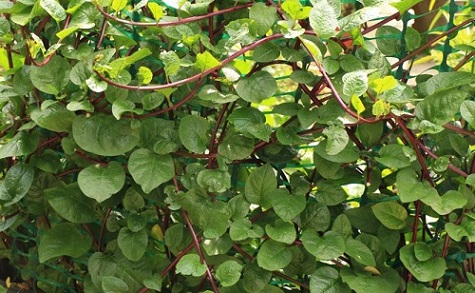Thailand led medical study finds that Malabar Spinach shows promise in preventing skin disorders including melanoma
Nikhil Prasad Fact checked by:Thailand Medical News Team Sep 19, 2024 7 months, 1 week, 5 hours, 41 minutes ago
Thailand Medical: In a groundbreaking study, a group of researchers explored the potential of Malabar spinach, also known as Basella alba, in treating skin disorders, particularly melanoma. The plant, which has been traditionally used in Thai remedies, was tested for its anti-inflammatory and anti-melanogenic properties in human skin cells. This study sheds light on how the extract of Basella alba can protect the skin from oxidative stress and inflammation, making it a natural alternative for preventing skin disorders and related conditions.
 Thailand led medical study finds that Malabar Spinach shows promise in preventing
Thailand led medical study finds that Malabar Spinach shows promise in preventing
skin disorders including melanoma
The study was led by researchers from Chiang Mai University, Thailand. Other scientists from Universitat de València, Spain, University of East Anglia, Chulalongkorn University, Thailand, and Rajamangala University of Technology Thanyaburi, Thailand also contributed to the study.
Malabar Spinach: A Traditional Remedy with Modern Potential
Traditionally, Basella alba has been used to treat various skin conditions such as rashes, burns, and ringworm. The plant’s extracts were known to have soothing effects on inflamed skin and were even used to prevent acne and freckles. However, until now, little scientific evidence backed up these traditional uses.
This
Thailand Medical News report explores how the study conducted by the research team delved deep into the plant’s potential benefits for skin health, especially in combating oxidative stress, inflammation, and excessive melanin production - issues closely related to skin aging and disorders like melanoma.
Study Methods and Key Findings
The researchers began by collecting Basella alba leaves from farms in Lamphun Province, Thailand. The leaves were processed to create three types of extracts using different solvents: water, 50% ethanol, and 95% ethanol. These extracts were tested on human melanoma cells and keratinocytes to determine their effects on melanin production, inflammation, and oxidative stress.
The results were promising. Basella alba extracts were shown to reduce melanin content and inhibit cellular tyrosinase activity, which plays a crucial role in melanin production. The extracts achieved this by downregulating MITF, a key gene responsible for melanin production. Additionally, genes such as TYR, TRP-1, and DCT, which contribute to pigmentation, were also suppressed.
The researchers observed that the plant’s extracts reduced oxidative stress markers, increased antioxidant gene expression, and significantly lowered inflammatory markers. These findings suggest that Basella alba could be effective in preventing and treating skin disorders caused by environmental stressors like UV radiation and pollution.
How Malabar Spinach Suppresses Melanin Production
Melanin production is a natural process that helps protect the skin from UV radiation. However, excessive production
can lead to hyperpigmentation issues like melasma and freckles. The study found that Basella alba extracts were effective in controlling melanin production. When melanoma cells were treated with these extracts, there was a significant decrease in melanin levels, particularly with the 50% and 95% ethanol extracts.
One key finding was the inhibition of the MITF gene, which is responsible for regulating melanin production. This gene, along with others like TYR and TRP-1, was downregulated by the extracts, leading to lower melanin production in treated cells. The study showed that Basella alba extracts had effects comparable to those of arbutin, a well-known skin-lightening agent.
Fighting Oxidative Stress and Inflammation
The skin is constantly exposed to external stressors like UV radiation and pollution, which lead to oxidative stress. This, in turn, damages skin cells and accelerates the aging process. One of the standout findings of the study was Basella alba’s ability to combat oxidative stress.
The plant's extracts increased the levels of antioxidant genes such as SOD-1, GPX-1, and NRF2. These genes are essential for protecting the skin against oxidative damage. Additionally, the study found that the extracts reduced the production of lipid peroxidation products like TBARS, which are markers of oxidative stress in cells.
Another key aspect of the study was the anti-inflammatory properties of Basella alba. Inflammation is closely linked to skin aging and disorders. The extracts were found to reduce nitric oxide production, a known inflammatory marker, as well as lower the expression of inflammatory genes such as IL-1β, IL-6, and COX-2.
The 50% ethanolic extract showed the most significant anti-inflammatory activity, reducing pro-inflammatory cytokines to levels similar to or even lower than those achieved by standard anti-inflammatory drugs.
Conclusions
The findings of this study demonstrate that Basella alba extracts have significant potential for use in skincare, particularly for preventing conditions caused by excessive melanin production and inflammation. The plant’s ability to reduce oxidative stress and inflammation, combined with its melanin-inhibiting properties, makes it a promising candidate for future skincare products.
The use of natural plant extracts like Basella alba offers a safer and more sustainable alternative to synthetic compounds commonly found in skin treatments. With further research, this traditional remedy could become a staple in modern dermatology.
The study concludes that Basella alba’s rich phenolic content, including compounds like catechin, caffeic acid, and p-coumaric acid, contributes to its effectiveness. The researchers suggest that future studies should focus on clinical trials to validate these findings in humans. Additionally, long-term safety and efficacy studies are recommended to ensure the plant’s extracts are safe for prolonged use.
The study findings were published in the peer-reviewed journal: Foods.
https://www.mdpi.com/2304-8158/13/18/2943
For the latest Research News, keep on logging to
Thailand Medical News.
Read Also:
https://www.thailandmedical.news/news/thailand-medical-researchers-develop-new-approach-to-fight-aggressive-breast-cancer
https://www.thailandmedical.news/news/thailand-medical-researchers-develop-new-nanocarrier-to-deliver-curcumin-directly-to-breast-cancer-cells
